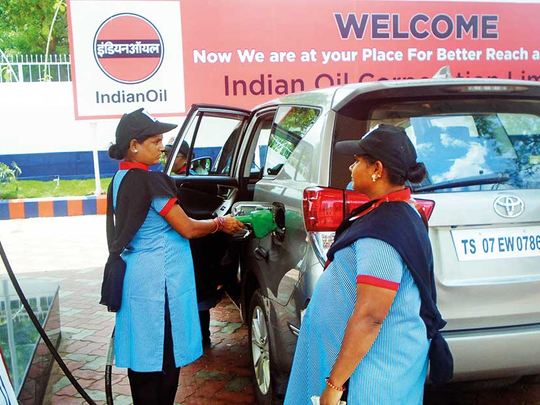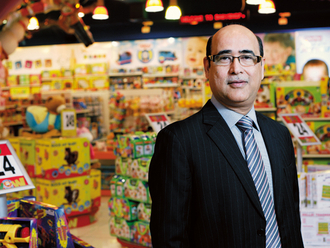
A short, sharp shower had cleared away the humid cloudiness of a summer day. The sunlight filtered through the freshly bathed lush greenery that paves the thoroughfare in the Chanchalguda area of Hyderabad. As if motivated by the freshness in the air, a sudden burst of traffic hit the streets from which cars, motorcycles and scooters queued up at the Chanchalguda petrol pump, adjuscent to Chanchalguda prison.
It’s nothing strange unless one considered that just a few metres away stood another petrol pump, almost empty. Sensing my curiosity, an auto-driver sitting casually in his three-wheeler chuckled and egged me on: “Go on, move up closer, you will understand.” He clearly preferred this petrol pump, having just refuelled there. Intrigued, I moved closer. The petrol pump seemed to be manned by an all-women staff. In three lanes, women in blue uniforms with caps to shield themselves from the sun, welcomed cars, three-wheelers, SUVs, scooters — deftly checked the fuel pump meters, fitted the fuel dispensers into vehicles, refuelled them, accepted payment and then briskly turned their attention to the next vehicle.
There is empirical evidence suggesting that women employees are perceived to be more honest and sincere. Perhaps that explained why people, including many women on two-wheelers with children riding pillion, preferred to queue up, patiently waiting for their turn.
A bold banner crowning the door to the small pump office proudly read: HYDERABAD SPECIAL PRISON FOR WOMEN — ALL WOMEN GAS STATION’. An initiative of the Hyderabad Special Prison for Women, the petrol pump was set up to provide jobs and a means of livelihood for some of the women convicts who had completed their prison terms. It was the brainchild of V.K. Singh, the Director General of Prisons in Telangana state. The prison, established in 1994 for female convicts, has been playing an active role in the rehabilitation of its former inmates. Numerous initiatives for their personal development and reintegration in society have been launched and are being successfully implemented. The thrust was to empower the inmates with vocational training and skills development that would enable them to lead honest, dignified lives while in prison and, most importantly, once they were released.
Central amongst such initiatives is the Mahaparivarthan, which roughly translates into English as ‘fundamental change’. Speaking to Weekend Review, Singh dubbed the initiative as a change in the very concept of prisons. “We want to change the very concept and scope of what a prison is. From a place of confinement, it should become a place for social welfare, income generation, GDP growth.”
The prison has facilitated numerous classes, courses and training workshops on literacy, physical fitness, health camps for the inmates to arm them with professional skills such as tailoring, embroidery, candle making, as well as providing the opportunity for educational courses for those who express a desire to continue their education.
“Most of the convicts come from underprivileged groups, from rural areas, often from poor families and broken homes,” says Basheera Begum, the prison superintendent who recently completed seven years of service here. “Most of them [inmates] who are serving prison sentences have taken to crime out of desperation, out of a lack of better opportunities.”
Crimes range from murder or robbery to selling liquor, which is illegal in Telangana state. Many of these were committed under duress — for instance, a woman killed her husband after years of domestic abuse; a case of robbery committed due to abject poverty or physical assault on a landlord after months of harassment and verbal abuse because there was no money to pay the rent.
While the law has to run its course, the objective here is to inculcate in the women a sense of self-worth and dignity, by aiming to change their mind and outlook on life. Basheera Begum, who interacts with the inmates on a regular basis, says she sees their human side and the tremendous potential they all have. “The prison is a correctional family, which aims to make better people out of those it houses, by changing the mindset where even for a second crime is no longer an option. We show them the immense potential they have.”
While convicts settled down to a life in prison, what was more difficult, points out Basheera Begum, was life after their release. Many released women were not welcomed back by their families. Most usually found it difficult to find jobs with their criminal past. Some of these women turned to a life of crime again.
That’s what made Singh, whose name evokes awe and respect amongst the women, think of initiating schemes to provide the released women with a livelihood. The petrol pump is one such scheme. While their training in prison equipped the women with skills such as embroidery or tailoring, Singh felt having them attached to prison schemes would provide them with security as well as benefit the prison, fitting in neatly with the concept of turning a place of confinement to something that contributed to society through social welfare. Together with Indian Oil Corporation which sponsored the initial equipment, and with money allocated from the Prison Development Fund, the petrol pump was inaugurated in late June on land belonging to the prison by the Home Minister of Telangana State, Navini Narasimha Reddy.
Sasikala (not her real name) is in her mid-30s and had been released a year ago after serving a term of six years. “It was difficult for me to find a job. I worked in a beauty parlour for a month but after the owner came to know my background, she asked me to leave.” A widow with two children to take care of, she was in a difficult situation as her family lives in the neighbouring state of Karnataka and Sasikala found herself alone in Hyderabad. “This [work] came as a gift from God,” she says.
It’s not just the job — the prison department provided her with a room on its facilities and got her children admitted in a boarding school.
For 72-year-old Neelamma, the oldest of the workers, the job helped her to keep her dignity while also allowing her to ease the family’s financial situation. Released a year and a half ago, before the completion of her full prison term on grounds of exemplary behaviour, Neelamma did not find herself unwelcome at her son’s home — the only family she had to return to. But her arrival added pressure to the family’s precarious financial situation. When she heard about the opportunity at the petrol pump, she began crying out of sheer relief. Keeping her age in mind, she was put in charge of a kiosk set up in a corner of the petrol pump that sells products made by the prison’s inmates — children’s clothes, woollens, scarves, kitchen linen.
Twenty-five women are employed at the petrol pump, each earning a monthly salary of Rs12,000 (about Dh700). The women work in two shifts and all of them have bank accounts where their salaries are deposited.
Was it difficult to learn the work? No, smiles Latha, who is in her 40s. Indian Oil Corporation conducted training sessions. Some of the women had done heavier work for much less pay. Here, they were guaranteed life-long work with dignity and safety. For those who had children living with them, the prison even provided them with school facilities. “It is like a family here,” observes Neelamma. Sharing the same history and background, they relate to each other with understanding and trust, an invisible bond binding them.
As the petrol pump is attached to the prison, a police guard is always present unobtrusively at the premises. The petrol pump is open seven days a week, from 9am to 9pm. The revenue from it pays for the staff salaries and the fuel, while the rest goes to the Prison Development Fund, benefitting both the prison and the women.
Observing the staff, it becomes amply clear that they have come into their own. They are brisk and business-like but smile easily. Vishnu Prakash, who works in the area and frequently visits the pump to refuel his car, notes that the women are honest. They resolutely refuse to give in to any bullying for exacting the correct amount, for not issuing inflated bills or for waiving any tax. Undoubtedly, Mahaparivarthan has made an impact and the petrol pump has become a symbol of hope.
Here, broken lives are put back together as people who had given up on life itself once again discover the promise it can hold. The petrol pump proves that an enabling environment can help put lives that went off-track back on track again.
Aditi Bhaduri is a freelance journalist based in India.












